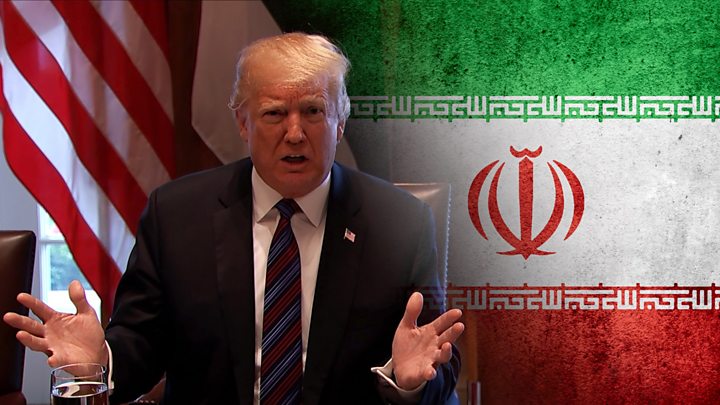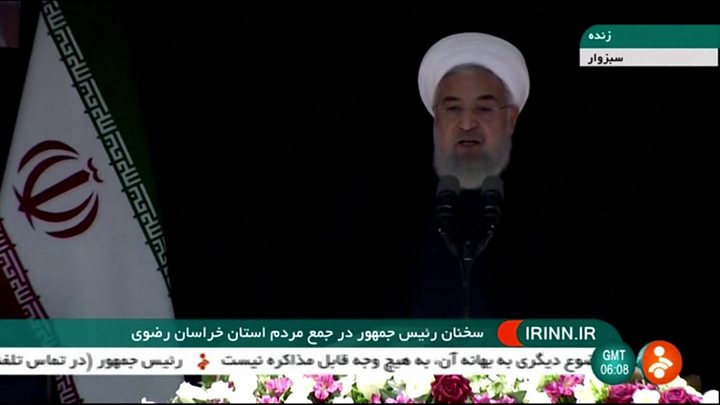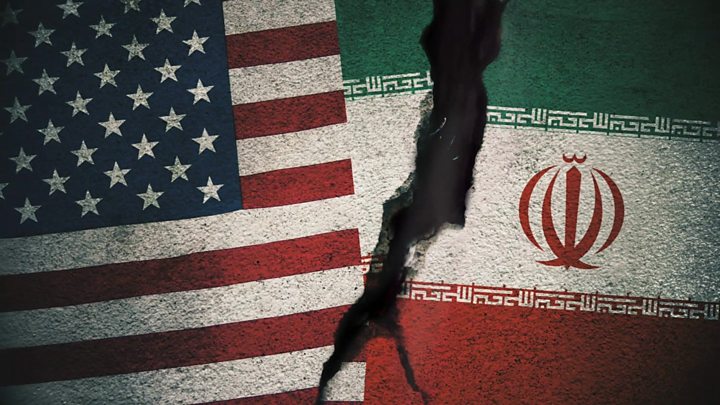UK Foreign Secretary Boris Johnson has urged US President Donald Trump not "throw the baby out with the bathwater" by tearing up the Iran nuclear deal.
Appearing on Fox News' morning show, Mr Trump's favourite, Mr Johnson said the 2015 accord was not perfect.
President Trump must decide whether to stick with the agreement - which he has called "insane" - by 12 May.
Under the international deal, Iran has limited its nuclear activities in return for eased economic sanctions.
While in Washington, Mr Johnson will not meet the president. But he will meet US Vice-President Mike Pence, National Security Adviser John Bolton and foreign policy leaders in Congress.
The British foreign secretary tried appealing to the president via fox & Friends, which Mr Trump is known to regularly tune into.
Mr Johnson began by saying Mr Trump "is right to see the flaws in" the deal.
He said countries have "got to be tougher on Iran" and "fix the flaws in the deal".
But he warned that without a deal, Iran could develop a nuclear weapon and start an arms race among countries in the region.
Mr Johnson concluded that "plan B does not seem, to me, to be particularly well developed at this stage".
Britain, France and Germany have been working behind the scenes for weeks in an effort to preserve the deal, which was orchestrated under the Obama administration, and includes Russia and China as signatories.
What is Mr Johnson saying?
During the Fox appearance Mr Johnson expanded on ideas he earlier set out in the New York Times.
There, he argued that "only Iran would gain" from abandoning nuclear restrictions.
"Of all the options we have for ensuring that Iran never gets a nuclear weapon, this pact offers the fewest disadvantages," he wrote.
Mr Johnson said the deal "has weaknesses, certainly, but I am convinced they can be remedied", adding that the UK was working with the US, France and Germany to achieve that.
He said the deal had put restrictions on Iran's nuclear programme and "now that these handcuffs are in place, I see no possible advantage in casting them aside", adding that the handcuffs should be improved, not broken.
Why are there differences among the allies?
Mr Trump has called the deal the "worst ever" and has threatened to withdraw unless the signatories agree to fix its "disastrous flaws".
He believes the terms are too lenient, in particular that the deal limits Iran's nuclear activities for only a fixed period and fails to stop the development of ballistic missiles.

Media playback is unsupported on your device
US Secretary of State Mike Pompeo said the nuclear deal had been "built on lies", after Israel revealed "secret nuclear files" accusing Iran of having run a secret nuclear weapons programme that was reportedly mothballed 15 years ago.
German Chancellor Angela Merkel, French President Emmanuel Macron and UN Secretary General Antonio Guterres have all warned Mr Trump not to walk away from the deal.
Mr Macron said he agreed the deal should have wider terms and address some of Mr Trump's concerns. He also said he feared Mr Trump would pull out.
Mr Trump must decide by 12 May whether to renew the waiver on sanctions, and has a wide range of options on whether to re-impose them.
What has Iran said?
President Hassan Rouhani said the US would face "historic regret" if it pulled out.

Media playback is unsupported on your device
In remarks carried live on state television, he said Iran had "a plan to counter any decision Trump may take and we will confront it".
But he also hinted Iran could work out a deal with other signatories, excluding the US.
Mr Rouhani said: "If we can get what we want from a deal without America, then Iran will continue to remain committed to the deal. But if not, Tehran will continue its own path."
Iran has said the documents produced by Israel were a rehash of old allegations already dealt with by the UN's nuclear watchdog.
What is the Iran deal?
In 2015 Tehran signed a deal with the US, China, Russia, Germany, France and Britain agreeing to limit its nuclear activities in return for the lifting of crippling economic sanctions.
Under the deal, officially known as the Joint Comprehensive Plan of Action (JCPOA), Iran is committed to slashing the number of its centrifuges, which are machines used to enrich uranium.

Media playback is unsupported on your device
It is also meant to cut its stockpile of enriched uranium drastically and not enrich remaining uranium to the level needed to produce nuclear weapons.
The number of centrifuges installed at Iran's Natanz and Fordo sites was cut drastically soon after the deal while tonnes of low-enriched uranium were shipped to Russia.
Furthermore, monitors from the IAEA have been able to carry out snap inspections at Iranian nuclear sites.
Bagikan Berita Ini














0 Response to "Iran nuclear deal: Johnson courts Trump on Fox & Friends"
Post a Comment